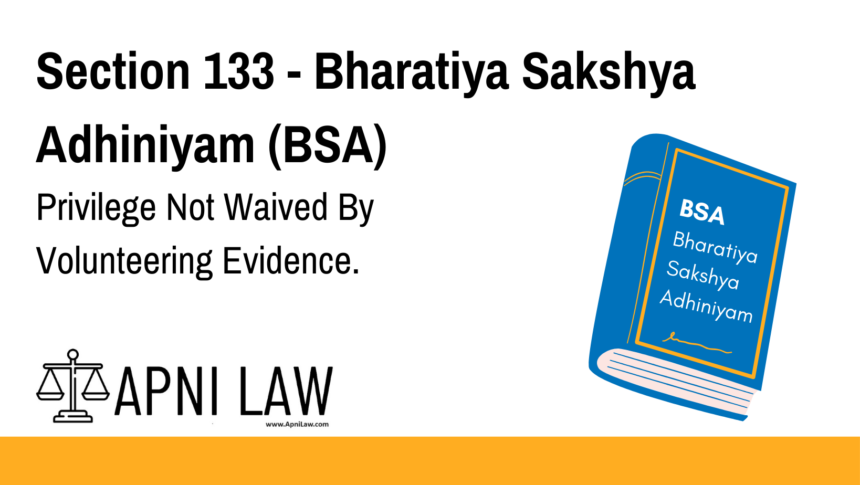Code: Section 133 BSA
If any party to a suit gives evidence therein at his own instance or otherwise, he
shall not be deemed to have consented thereby to such disclosure as is mentioned in
section 132; and, if any party to a suit or proceeding calls any such advocate, as a witness,
he shall be deemed to have consented to such disclosure only if he questions such advocate,
on matters which, but for such question, he would not be at liberty to disclose.
Explanation of Section 133 BSA
Section 133 of the Bharatiya Sakshya Adhiniyam (BSA) establishes that a party to a suit or proceeding does not waive their right to confidentiality under Section 132 by merely providing evidence or volunteering information. In other words, a party’s decision to testify does not automatically permit disclosure of privileged communications.
Additionally, if a party calls their advocate as a witness, the advocate is not obliged to disclose privileged information unless the party specifically questions the advocate about matters that would not be disclosed except for that question.
This section ensures that the confidentiality and privilege granted under Section 132 BSA are not easily waived, safeguarding the professional relationship between advocates and their clients.
Illustrations
Example 1: Volunteering Evidence
A, the defendant in a lawsuit, decides to testify in their defense. By providing evidence, A does not waive the protection of confidentiality between themselves and their advocate under Section 132 BSA.
Example 2: Calling an Advocate as a Witness
B, the plaintiff, calls their advocate as a witness in the case. However, B only questions the advocate about facts relating to the case and not about confidential communications. The advocate is not required to disclose any privileged information unless B questions them about matters that would otherwise remain confidential.
Common Questions and Answers on Section 133 BSA
1. Does volunteering evidence in court waive the confidentiality privilege with my advocate?
- Answer: No, volunteering evidence does not waive the confidentiality privilege, and the advocate is not required to disclose any information protected under Section 132 unless explicitly questioned about it.
2. Can a party call their advocate as a witness and require them to disclose privileged information?
- Answer: No, an advocate will not disclose privileged information unless the party asking them to testify specifically questions the advocate on matters that would otherwise remain confidential.
3. If I testify in a case, can I be forced to reveal communications with my advocate?
- Answer: No, your testimony does not force you to reveal communications with your advocate, as those remain privileged unless explicitly waived.
Conclusion
Section 133 of the Bharatiya Sakshya Adhiniyam (BSA) reinforces the principle of legal confidentiality. A party’s decision to provide evidence or to call their advocate as a witness does not waive the privilege granted under Section 132 BSA, protecting the confidentiality of communications between advocates and their clients. This ensures that legal professionals and their clients can engage in open, honest communication without fear of disclosure unless specifically required by law.








